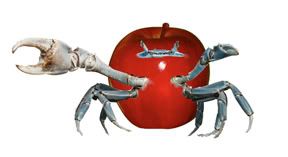I'm a simple [minded] man. Upon encountering a compound word I, like many of my fellow humans, naturally assume it to be a portmanteau word, where the meanings of the root words are also combined. One great example of this concept is the spork. Spoon + fork = spork. Even if you'd never encountered such an implement, it's easy to imagine what it would look like. Food is not excluded from my blind assumptions. After all there are so many examples that wholly support my bias. Take for example

the strawberry,

the watermelon,
and my favorite of all

the crab apple.
I'll admit, my natural assumption is highly illogical but is it the fault of my misguided brain or the inconsistencies of the English language that are to blame here?
I don't do the typical breakfast foods but I associate buttermilk pancakes and biscuits with creamy buttery goodness since the pictures of said items always show a steamy mound of carbs slathered in creamy, melting butter. With this association stuck in my mind and my biologically driven love for butter, I had always assumed butter milk was just as the name implied: some unsalted, half-churned stop off between whole milk and butter.
I hadn't given the stuff much serious consideration until I saw it on the menu at a local restaurant. For a week I couldn't get my fabricated idea of buttermilk out of my head and I leisurely daydreamed of drinking this frothy fat smoothie. It took some frantic searches of a few local stores to find it, but on my next shopping trip I was able to secure a liter of the mythic buttermilk. Immediately upon arriving home I dispensed with the requisite pictures and got down to business.
The slight scent of salt hit my nose and I initially thought that, like most butter, it was just salted but then the culture followed. Sour milk. Intentionally sour milk at that. We were dealing not with the formula buttermilk = butter + milk. Instead, like many of life's mysteries, the answer to the equation x = buttermilk - milk was far less obvious. In this case, solving for x would give us an approximation of yogurt + salt.
According to Wikipedia, fount of all modern knowledge:
Buttermilk is a fermented dairy product produced from cows' milk with a characteristically sour taste. The product is made in one of two ways. Originally, buttermilk was the liquid left over from churning butter from cream. In India, buttermilk, widely known as "chaas" is known to be the liquid leftover after extracting butter from churned curd (dei). Today, this is called traditional buttermilk. On the other hand artificially made buttermilk, also known as cultured buttermilk, is a product where lactic acid bacteria called Streptococcus lactis have been added to milk.
See, "originally" I wasn't as wrong. In the original meaning, the fat was mostly removed from the milk/cream leaving a leaner liquid behind, not the fatty broth I was dreaming about, and still tart due to the high lactic acid concentration. Quite possibly to increase its longevity, the beneficial bacteria were added to the mix in other cultures, giving it more of a sour, yogurt-like taste.
I drank up and I drank deep but by the end of my little glass I couldn't stomach the thought of tasting any more until the next day when I'd slightly forgotten what it was like. Rather than comparing it to yogurt, I guess it would be more apt to describe the texture and taste as being like a blended and slightly diluted batch of cottage cheese. Not bad, but not something I could drink with any regularity.
Health nuts take note, it is quite a nutritionally sound beverage. There is less fat than whole milk, high levels of potassium, vitamin B12, and calcium and the added bacteria aids in the absorption of the protein.
So there you have it, further evidence of my shocking ignorance but at least I now know to be a little more careful next time when making assumptions about foods with compound names (at least I still have the Aprium to back me up). I think I'll go knock back a few shots of pure cream to lift my spirits.














